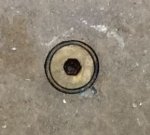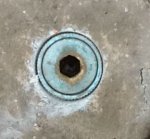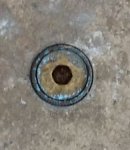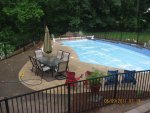Hi all, PB installed the cover and anchors about 4 weeks ago. Within two weeks some of the anchors are showing signs of Oxidation or Corrosion (see pictures). My parents had a safety cover with anchors that were 15 years old or so, and I don't remember them showing any signs of corrosion.
Is this normal? Is this something to be worried about? PB is closing the pool today, should I do something to the anchors before they get here?
After the cover is removed in the spring, should the corrosion be cleaned off and a protectent of some kind be applied (I realize I need to clean and lubricate the threads, I'm asking about the corrosion/oxidation)?
Thanks for any and all replies.
Is this normal? Is this something to be worried about? PB is closing the pool today, should I do something to the anchors before they get here?
After the cover is removed in the spring, should the corrosion be cleaned off and a protectent of some kind be applied (I realize I need to clean and lubricate the threads, I'm asking about the corrosion/oxidation)?
Thanks for any and all replies.





